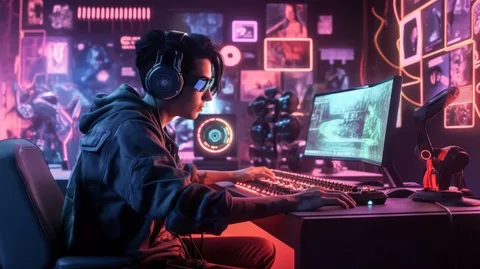Imagine waking up, putting on a lightweight neural interface, and entering a fully immersive world where you can feel the rain, smell the sea, and interact with others in lifelike environments — all without leaving your room. Sounds like science fiction? It might be closer than we think.
The gaming industry has evolved rapidly, and the next 15 years could redefine what “playing a game” even means. Here’s a speculative glimpse into where we’re heading.
AI-Generated Worlds on the Fly
Today’s open-world games like Red Dead Redemption 2 and The Legend of Zelda: Tears of the Kingdom offer vast, detailed environments. But what if those worlds weren’t pre-designed?
In the future, we may see AI-generated, player-specific game worlds — infinite landscapes that shift and respond to individual choices in real time. Instead of scripted missions, an intelligent engine might generate quests and characters dynamically, based on your behavior, interests, and play style.
These systems could learn how you play and evolve with you — not unlike how platforms like homebet88 respond to player choices by modifying the experience in real-time based on input and engagement.
Neural Interfaces and Thought-Based Controls
Forget controllers and VR handsets. Companies like Neuralink and CTRL-labs are already developing neural tech that could one day allow us to control games with our thoughts.
Instead of pressing buttons to jump or aim, you could simply think the action. This wouldn’t just make gameplay more fluid — it would also open gaming to players with physical disabilities, allowing for more inclusive and intuitive experiences.
Combined with advanced haptic feedback, this could lead to sensations of touch, weight, and texture in virtual environments.
Hyper-Realism and the Ethics of Reality
As visuals become indistinguishable from real life, the ethical boundaries of gaming will be tested. If a game character feels real, talks like a real person, and reacts emotionally — what responsibilities do developers have?
Games may soon challenge not just reflexes or logic, but moral frameworks in ways that blur the line between simulation and reality. Players might be held accountable for in-game decisions, especially in shared multiplayer spaces where others are equally immersed.
This opens fascinating questions: Will there be laws governing virtual behavior? Could your digital actions affect your real-world reputation?
The Rise of “Game-Life Hybrids”
We’re already seeing the gamification of daily life through apps that reward steps, learning, or productivity. In the future, life and gaming may become inseparable. From earning in-game currency for completing real-life tasks to social platforms that double as competitive arenas, everything could carry a game layer.
Entire online ecosystems — including marketplaces, skill-based challenges, and even entertainment hubs like homebet88 — could be gamified into a shared metaverse where play and purpose merge.
Conclusion
By 2040, video games may no longer be something you play. They might become something you live. As technologies like AI, neural links, and real-time simulation mature, the boundaries between our physical and digital selves will continue to dissolve.
It’s not just about better graphics or faster loading screens. The next frontier in gaming is one of experience, identity, and meaning — where every decision, action, and interaction matters in ways we’re only beginning to imagine.
Let me know if you’d like a condensed version of this post for social media or a more speculative angle focused on specific technologies like AR, AI, or blockchain.


